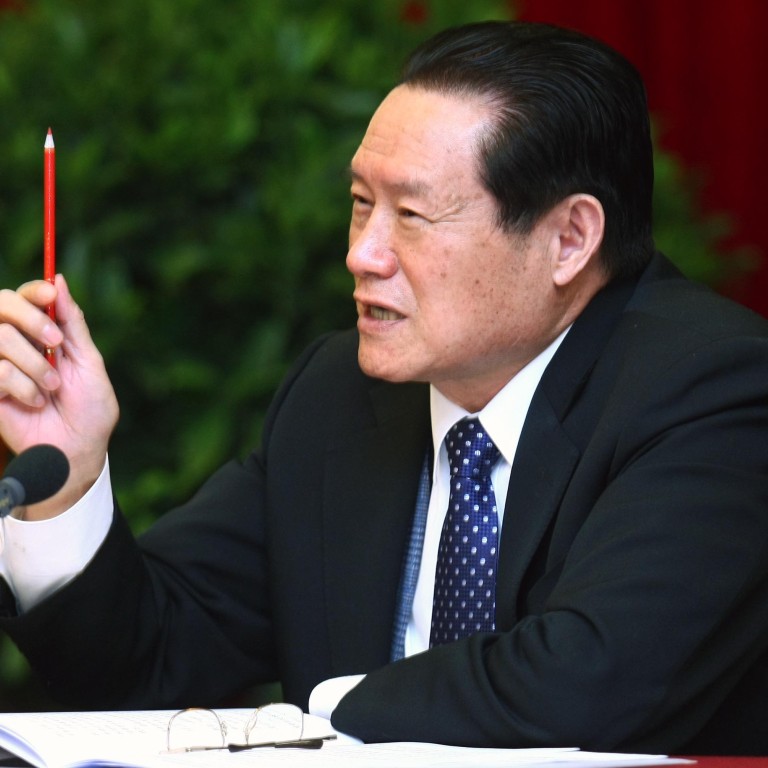
New | Zhou Yongkang won't easily escape the net of Xi's corruption crackdown
Deng Yuwen andJonathan Sullivan say president must keep his promise of hunting tigers
Whispers surrounding President Xi Jinping's "tiger hunt" - a metaphor for going after corrupt senior government officials - have been circulating ever since he assumed the top positions in party and state in 2012.
In recent days, many Chinese-language media outside mainland China have reported that Xi's tiger hunt is about to pay dividends, with the "capture" of former security tsar Zhou Yongkang .
Until 2012, Zhou was a member of the Politburo Standing Committee, with oversight for the police, courts and intelligence services. Although Zhou was widely believed to be guilty of corruption and abuse of power, no current or retired member of the Politburo Standing Committee has ever been prosecuted.
This would be a groundbreaking case.
Whether Xi was motivated to establish his own authority or by the health of the one-party state system, he must make good on the promise he made last year to take down both "flies" (corrupt low-level officials) and "tigers". Otherwise he will fall into the same trap as previous leaders in their half-hearted anti-corruption efforts.
To reduce the intensity of the opposition, the case against Zhou has to be cast iron
Chinese people looked forward to Xi's tiger hunt with ghoulish anticipation, speculating who would be the first to fall.
The view among many ordinary Chinese was that the reviled Zhou, who oversaw a decade-long retreat from the rule of law, would be a good candidate, although speculation about the extent of his crimes has become progressively fantastical.
Reports suggesting he was in cahoots with former rising political star Bo Xilai , who was jailed last year, to plot a coup or assassination are simply not credible.
The reality is that no single political actor in China has the capacity, or opportunity, to pull off a coup or to place a protégé in power.
Since launching the current anti-corruption drive, Xi has clearly marked out Zhou and his cronies in the powerful oil industry as the main target. Given the scale of Zhou's operations, any action will take time, although the anti-corruption campaign has already reached his former domain, the Ministry of Public Security.
The recent fall of Zhou's close associate Li Dongsheng, a former vice-minister of public security, suggests that the hunt is closing in.
Is there still a chance that Zhou might get away? One thing in Zhou's favour is that he was, after all, in charge of the state security apparatus for many years, during which time he must have collected a huge amount of dirt on other officials with which to bargain for his own survival.
This is a test of Xi's dexterity as a leader and these strategic considerations probably explain delays in resolving the case.
However, if Xi were to let Zhou off, for instance because of the opposition from retired party leaders (setting a precedent of non-immunity for former officials makes a lot of former officials nervous), his authority would be severely compromised.
In effect, it would announce to the world that his anti-corruption campaign had already failed.
If he takes Zhou down, especially if it is to the chagrin of some retired party elders, Xi will enjoy popular support and send a strong message to party cadres, increasing his capacity to be a really effective party general secretary.
In this instance, Xi would rather offend party elders than the public, but in order to reduce the intensity of the opposition, the case against Zhou has to be cast-iron.
If it can be proven that Zhou is even half as spectacularly malfeasant as has been reported, allegedly amassing an ill-gotten fortune of, even for China, extraordinary proportions, who will dare speak up for him?
The resolution to this case will probably come before the regular scheduled legislative meetings in March. If Xi can achieve this breakthrough before these meetings, he will further cement his authority and will be well placed to push forward the broad reforms that he advocates.
Last November, the Chinese Communist Party issued a five-year plan to fight corruption, which stated that, no matter what their position, any corrupt official could be investigated.
If Xi keeps up the pressure on corruption, and some genuine tigers are brought down, party cadres at all levels will become less egregious in their transgressions.
But, at some point, the root causes and systemic issues that have allowed corruption to become endemic throughout the country's political and economic systems must be addressed.
Only then, when the campaign moves from the authority of individual leaders to the rule of law, will the basis for China's anti-corruption reform become normalised and more transparent.

